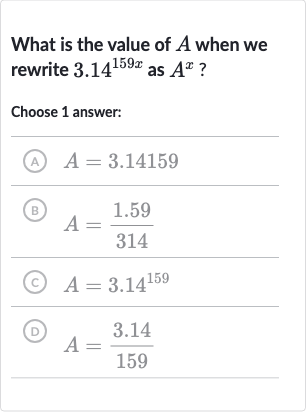Full solution
Q. What is the value of when we rewrite as ?Choose answer:(A) (B) (C) (D)
- Given expression: We are given the expression and we want to rewrite it in the form . To do this, we need to find a value for such that is equivalent to .
- Finding A: To find A, we can equate the bases of the expressions, since the exponents are already in the desired form . This means we set equal to the base of the given expression raised to the power of . Therefore, .
- Matching the result: Now we look at the answer choices to see which one matches our result:(A) (B) (C) (D) The correct answer is (C) , as it matches our calculation.
More problems from Compare linear and exponential growth
QuestionGet tutor help
QuestionGet tutor help
QuestionGet tutor help
QuestionGet tutor help
QuestionGet tutor help
QuestionGet tutor help
QuestionGet tutor help

